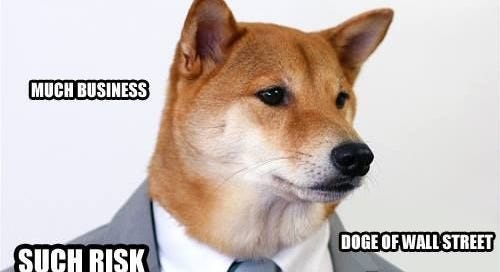Business lessons from a year of failing at options trading
Options trading has some interesting parallels to the risk-taking of entrepreneurship
Not wanting to miss out on a pandemic cliché, I spent a lot of 2020 and 2021 doing a deep dive into options trading1. I learnt that it is a fantastic way to quickly donate your wealth to professional Wall street traders and algos. I also found that its pure and direct relationship to risk gave me some lessons to take back and apply to the world of entrepreneurship.
Seek Short Feedback Cycles
Successful options trading and starting a business are about taking calculated risks. In options trading the risk is stark and obvious - you have realtime profit and loss on your screen at all times - every action you take is quite obviously a risk.
With a business on the other hand, accurate profit and loss can be months behind real time. Also as you’re likely involved in many disparate activities, most of the time you probably don’t have an in-the-moment sense of risk taking from what you do on a day-to-day basis.
If you could have a real time profit indicator on your business activity/project, you’d be able to stop the ones that aren’t working and focus on the ones that are. But as the “fail fast” mantra goes, see what you can do to shorten/short circuit feedback times, or focus on things that have an inherently shorter cycle (like paying for search ads vs SEO).
Yes, some great things will have long slow feedback cycles, but you can try those later after you’ve had some success short cycles.
Know how much work you are committing to
In options trading there’s very little work to do once you’ve made your decision. If you want to buy AAPL (Apple inc), you just click a button - the work is coming to the decision. It couldn’t be more different in the world of entrepreneurship, the decision to do something usually marks the beginning of the work.
So my take-away here, is to look before you leap - be aware of how much work you may be committing to when you start something. Similar to the short feedback cycles idea, (and the lazy entrepreneur) you should be biased towards things that take much less work, that way you can get more rolls of the dice for the same effort.
Don’t make key decisions in an emotional state
Even though it’s just essentially looking at number on a screen, options trading is one of the most adrenaline fuelled activities I’ve ever tried. Seeing my account balance wildly fluctuate was an emotional ride. Quite famously many trading algorithms and professionals profit from the predictable human emotional reactions of the “retail” traders (the panic sellers, the chasers etc).
The takeaway here is to not put yourself in a position where you are making decisions in an emotional state. And thankfully this is much easier in a business than in options trading. If you recognise you’re not in a calm state, most of the time just you can simply postpone decisions, by days or even weeks if need be.
Know the difference between hope and having a plan
One fun term I learnt from the world of options trading was “smoking hopium” - this describes someone who holds on to a losing trading, watching as they lose more and more money still hoping things will turn around rather than cutting their losses and moving on.
Of course you don’t expect things to always work immediately, so you’ll generally expect to see some red before going green. But it’s crucial that you’re either good at adjusting your assumptions and changing course on new information, or you have your decisions laid out ahead of time (I’ll cut my losses at -10%).
I assumed I’d be rational and good at adjusting my strategy based on new information. But I’m only human, which means I am adept at doubling down on wrong ideas despite evidence to the contrary.
So this idea is a variation on the “don’t make key decisions in an emotional state” theme - if you already have a plan, then your decisions will already be made, no need for any hopium.
Know when to stop, know when not to trade.
Entrepreneurial success isn’t strictly correlated with time invested - it’s not “a good days pay for a good days work”. It’s even more extreme in options trading as it’s possible to make the majority of money for your year in one afternoon. As with options trading, so in entrepreneurship - the payoffs from your activity are non-linear, some things bring in orders of magnitude more than others.
One of the classic sources of failure in options trading is “over trading” - that is taking many mediocre opportunities rather than being disciplined and waiting for good opportunities. As the lazy entrepreneur will be quick to point out, sometimes is better to do nothing than do something mediocre.
Similarly, it’s important to know when to stop. I could go into more detail illustrating this with examples, however I think it’s only appropriate that I apply the lesson to this edition of Mr Kirkland’s Musings, and stop here.
To simplify the term, “options trading” is short(ish) term speculation on stocks and similar financial instruments.




